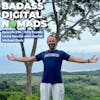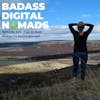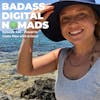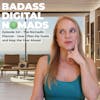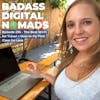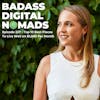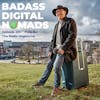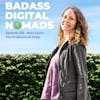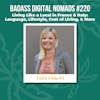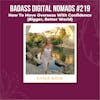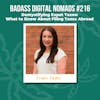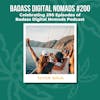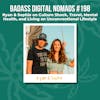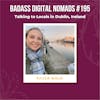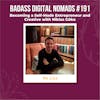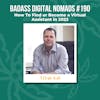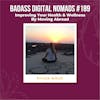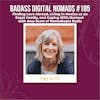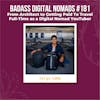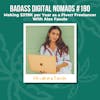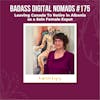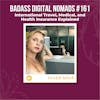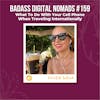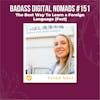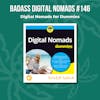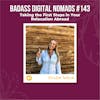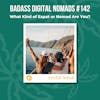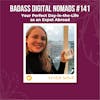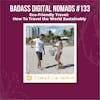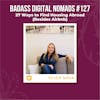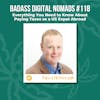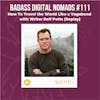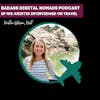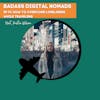How To Make Money Online Fast With Online Freelancing
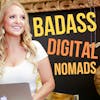
There are many ways to make money online, but one is faster than all the others, plus doesn't cost you anything to get started. In this episode, find out the top five ways to make money online to fund your digital nomad lifestyle and six steps to...
There are many ways to make money online, but one is faster than all the others, plus doesn't cost you anything to get started.
In this episode, find out the top five ways to make money online to fund your digital nomad lifestyle and six steps to follow, step-by-step so you could potentially start making money online today. Grab a pen and paper and let's get started!
Make sure to check the show notes page for links to all the resources and tools mentioned in this podcast.
FREE TOOLS FROM THIS EPISODE:
- Free Workbook: Steps to Making Money Online
- Open a fee-free digital bank account with Oxygen
- Open a free Transferwise account and get a free transfer up to £500
SHOW NOTES & RESOURCES:
* New Badass Digital Nomads Merch! * (Teespring.com/Stores/TravelingwithKristin)
- Bonsai Freelancing Software
- WaveApps Freelancing Software
- PayPal Invoicing
- Strengthsfinder Skills Assessment
- Video: How to Make Money Online From Home
- Recommended Podcast: The Richie Norton Show
WORK WITH KRISTIN
- Book a private consultation
- Join the Make Money Mentorship 6-week program (Special offer for podcast listeners $100 off)
........................................................................................................
Support the Badass Digital Nomads Podcast:
- Become a Patron
- Review on Apple Podcasts
- Leave a voice message
- Submit a question or recommend a guest (feedback survey)
Connect With Kristin on Socials:
-
- Follow on Instagram
- Subscribe to Digital Nomad TV on YouTube
- Subscribe to Traveling with Kristin on YouTube
- Join the Badass Digital Nomads Facebook Group
Kristin: 00:00:00 Figuring out how you can make money online, because a big problem in modern day society is that we might have dreams as little kids, but then we forget what they are because we go through the school system starting in preschool, and we might get confused along the way with other people's ideas or society's ideas of what we should do for work and how we're contributing to this society and to this economy. And sometimes those things are different. Frequently they are different than what we're naturally inclined to do. Or we pick up all of these limiting beliefs like, you can't make money as an artist. Just recognize that you could make money online and you could probably do it doing something that you like doing versus something that you hate doing.
Introduction: Welcome to Badass Digital Nomads, where we're pushing the boundaries of remote work and travel, all while staying grounded with a little bit of old school philosophy, self-development, and business advice from our guests.
Kristin: 00:01:14 Hi everyone. Welcome back to another episode of Badass Digital Nomads. I'm your host Kristin Wilson from Traveling with Kristin. And today's podcast is about how to make money online fast, as in perhaps today, and not in a sell your stuff on eBay type of way, but in a way that comes naturally to you, in a way that you can use your skills that you are put on this planet to use. And, uh, the, the instructions that I'm going to give in the podcast today are the same ones that I have followed myself to make money online since 2008, I think was the first time I started making money online. And this podcast is not going to be a guide for how to learn a new skill or start an online business in something that you don't have experience with yet. It's just a guide for potentially making money today in like the next 24 hours with skills that you already have.
Kristin: 00:02:34 So I'll give you a bit of an overview about how this is going to go, who this podcast is for, who should listen to it, and then I'm gonna lay out exact steps that you can listen to while taking notes and actually go along and do the steps with the podcast. So there's a few different ways that you can do it. Now, will you become a millionaire overnight after listening to this podcast? No. Uh, will you have a scalable passive income online business tomorrow? No. Um, but will you be able to figure out something that you can realistically do to make money online from anywhere? Yes. So the goal of this podcast is to help you stop thinking about and planning and waiting to make money online. It's to actually get over the hump of taking the first step to making money online. Whether that's reaching out to a potential client or closing your first sale or making your first dollar online.
Kristin: 00:03:43 Um, it's just going to give you a roadmap of what I have done multiple times in the past to be able to fund the digital nomad lifestyle that I've had. So you might wanna listen to it once and then listen again with paper and a pen or just press pause now. Go get something to take notes with and then set aside the next couple of hours to following each step and getting it done. Because, you know, the coronavirus has clearly shown that no job is safe. And so whereas before working for yourself or um, freelancing or making money online could have been seen as risky, we now know that it's not any riskier than having a traditional job. So what I'd like to share in today's podcast is how to do something that I think all of us should have been taught in middle school or high school, but instead in the traditional school system, we were simply being primed to either go to college or to go into the workforce.
Kristin: 00:04:57 And so we weren't necessarily taught entrepreneurship or how to make money on our own accord. We were just taught how to be good workers. So this is all something that I think people will, people have already started learning and will have to learn in the future. But most of us, you know, we don't have the luxury of waiting anymore. We have to do it now. So you should listen to this podcast if you're curious about the fastest way to make money online and you just want to know how to do it. And you should also listen if you're ready to do it or if you're not ready and you don't feel ready, but you're committed to following the steps and seeing what comes out of it. So it's not gonna be like easy listening, entertaining half listening podcast. It's like a podcast episode where, you know, you probably wanna like set some time aside to actually do it, kind of like a masterclass.
Kristin: 00:06:07 So then you can re-listen over and over if you need to. You probably shouldn't have to listen to it more than like once or twice. But if you would like some one-on-one support, um, I've also created a six week mentorship program for people who want to make money online like within the next month. Um, or if you have a business idea or if you need help finding clients, and I'll put a link to that in the show notes. It's um, digitalnomadbootcamp.podia.com. And I'll also give you guys a code for a hundred dollars off of the online course for being listeners of the podcast. So, but also you can just listen for free <laugh> and follow the steps. But if you want more one-on-one help, then that's also available. And so I should also give a disclaimer probably that this is not financial advice or a guarantee, but this is just what I've done and what works and what I keep doing over the years, whenever I need to generate money online or, um, make some extra cash or a new revenue stream.
Kristin: 00:07:17 And, you know, I'm not an internet millionaire, but I do know a hundred different ways to make money online that I've done myself. And so I can just share what works for me. So that's a good question. Why am I making this specific podcast and why am I sharing this information? And there's a lot of reasons, but the number one reason is because people ask me all the time, this is like the most common question I get is like, how to make money online. And to be honest, it's taken me a long time to formulate an answer that would work for a lot of people because there are so many ways to make money online, but there's also a lot of scam information out there. And so probably the second most frequently asked question I get is, what are like legitimate ways to find remote jobs?
Kristin: 00:08:12 Or what are non scam ways to make money online? Um, so I challenged myself to come up with an answer, especially because of the pandemic. I just felt like it was a really urgent topic. So I've spent the last couple months just really contemplating this and working through it and, and helping other people do it. Um, helping my consulting clients make money online. Um, a lot of actually listeners of this podcast, so they have started building their online businesses this year and especially since the pandemic. So I just wanted to make it available for more people. And also because I've never had a nine to five job guys and I don't know if anybody has read my bio on my website, but it's like the whole reason that I started making a personal brand about how to travel and work remotely and sustain yourself while doing it and have this lifestyle of freedom is all because I never knew what I wanted to do <laugh> in life.
Kristin: 00:09:27 I I struggled so much since ever since middle school with figuring out what I wanted to do for a job. And in hindsight I realized it was because I made up my own job. And so it's, I'm really passionate and I feel very strongly that other people can do the same thing and so many people already have, but there's just not a lot of information out there about, about how to do it or you have to filter through a lot of scams to get to that information. So, um, if you haven't read my bio, I basically talk about how in middle school I used to get straight A's, I was like a straight A student, but I always failed <laugh>. The, uh, career inventory tests that were like personality kind of job inventories. I had such diverse interests that it would always come back undefined or like an error message.
Kristin: 00:10:33 So all of my classmates next to me would be like, oh yeah, I'm gonna be a doctor or I'm gonna be a firefighter, or whatever. And I was like, <laugh>, I'm finally gonna know what I'm gonna do in my, in my life. And then I would open the envelope and it would be like error message. And so, you know, that's how I started this journey into traveling, um, because I was like searching for myself, <laugh> searching for what to do. And I did a lot of jobs that were basically like Mr. Wright now, but not Mr. Wright. And those jobs were good for a while, but it's taken many years to figure out, um, what I wanted to do. And actually this week I shared a video about Europe's, um, travel restrictions or their opening up their borders to a few different countries. And Dave Williams, who's been on the podcast who's the founder of Nomad X, he was like, oh, my favorite digital nomad, uh, news reporter.
Kristin: 00:11:36 And I laughed because I was thinking like, there's another job <laugh> that that didn't exist before that I've created, but you can do it too. And that is what I want to share with you. 'cause I always say there's as many ways to make money online as there are people in the world. So anyway, I'm gonna get into it, um, in just a minute, but I just wanted to remind everybody that oh no, I wanted to say thank you to the review of the week, who is, um, from Edher who left a review in the Apple store. And he says, this is of the podcast very informative. It is always a time for having a good time and learning while listening to Kristin. She's a person you can connect with and ask her a question and she will always respond with clear answers. So thank you Edher for your podcast review.
Kristin: 00:12:31 Edher is also in our Facebook group, Badass Digital Nomads. So I hope that you guys have a good time and learn a lot today, um, on this podcast. So also a reminder before we get started that we have official Badass Digital Nomads podcast merch out now on Teespring. And you can check it out from my YouTube channel Traveling with Kristin. It will pop up now at the bottom. Um, or you can go directly to teespring.com/stores/TravelingwithKristin. And we have tees, tank tops, coffee mugs, cell phone cases, stickers for your laptop, a digital nomad beach towel, uh, lots of fun stuff over there. And we also have a slow travel design that has a remote worker with like a laptop and a turtle backpack. And that's really cool. So check those out. And also on my channel, on my YouTube channel this week we have two videos about the lifting of travel restrictions to Europe as of July 1st, 2020.
Kristin: 00:13:41 And a video that's coming out about how I make money online with 10 of my different revenue streams that I made based on requests from people in YouTube video comments. So make sure to check that out. Alright, are you ready? Are you ready to get into it and figure out what is the fastest way of making money online? Let's get started. So before getting into the one way that we're going to cover on this podcast, there are five main categories I would say of how to make money online. And I'm not talking about like filling out online surveys or participating in focus groups or like playing games and getting Bitcoin or something like that. But like the main categories of how to make like a sustainable long-term income using the internet. The first way, which is the way that we're going to dissect in this podcast episode, is offering freelancing services online.
Kristin: 00:14:53 This is something that can be done anywhere and of course freelancing can be done in person, but there's also many ways to offer your services and monetize your skillset through offering online freelancing services. So in this podcast, I'm gonna talk about exactly how to do that, like how to figure out what to offer and where to offer it to, who <laugh>, how to find clients and how to get paid. And then the second way, and I put freelancing services first because it's the fastest way to make money online. And it is the most common way I think that people make money online based on my non-scientific research. But then also, um, statistics about independent workers in the world. It's such a growing population. Then the other way is starting an online business or a remote company. The third way, these are not in particular order anymore.
Kristin: 00:15:56 The third way is building a personal brand because that is something of value that remains with you for your whole life and will allow you to create opportunities to make money from anywhere typically involving the internet. And then the fourth way is finding a remote job. So this can be part-time, full-time, salary job, contract job. And then the fifth way is by setting up automated income streams or passive income, for lack of a better word. But I mean sometimes it could actually be passive income through investing, for example, um, or real estate. And sometimes it's automated income that is through something where you set it up once and then it pays you dividends later, such as affiliate marketing or drop shipping or something like that. Um, or something like Airbnb arbitrage where you set up a system for making a monthly income and then you have to nurture it over time, but it's like you're not necessarily trading your time for money like you are with working an hourly wage or freelancing.
Kristin: 00:17:13 So those are the five major categories, but the problem with most of those is that they take different amounts of time and energy to set up and a different learning curve. So we're not gonna cover all of those in one podcast, but for example, finding a remote job, it could take you a few days or a week or it could take six months. You know, starting an online business it could take a year or learning a new skill to do something new. It could take a couple months. So that's why I wanna focus on this first one because it's just the fastest way. So, you know, you don't need to learn how to code or build a website first or start an email list or start a blog or make content or any of these other things that you can do to make money online.
Kristin: 00:18:08 Um, you just, the fastest way is just to offer to help people with skills you already have. So offer your existing skillset to solve the problems of other people that you already know. So people in your personal network just offer your skills to people in your personal network. You don't have to go on Fiverr or Upwork and compete with people from all around the world to get jobs from strangers. You probably already know people who, um, who you can help with things that you know how to do and they don't know or they don't wanna do it <laugh>. So, um, my main source of online income for the past really like 10 years has been related to real estate travel and relocation. But the pandemic has obviously reduced that income, but it's no big deal because I have a lot of different revenue streams. So I actually use the steps that I'm gonna give you in this podcast to start getting freelancing clients for content creation, so for writing, for video production, for social media, um, that sort of thing. So this is something that I've already done, I've just put it into steps so that you can follow it. So let's get into it. Um, step one, how many steps are there? Let's see. So just so you know, I have six steps here.
Kristin: 00:19:57 I also have a video, um, from a couple weeks ago on how to make money online that goes over this. But I go into it in more depth here. And actually the um, step one is kind of the intro of that video and that seems to be people's favorite part of the video. And step one is to recognize that you can make money online. That's it. It's just to take a moment to understand, let it resonate, let it sink in with you that if millions of other people have done it, that you can do it too and you don't have to wait any longer to start doing it. So it's kind of hard to so succeed at at doing this if you don't believe really deep down that you can do it or that you think that you need to learn something extra or some extra skills or another course or something.
Kristin: 00:20:57 But the most important thing to do is just to start in a positive frame of mind. Believe you can make money online and then figure out what your motivation is to do it. Um, I just read, well not read every morning, I listen to podcasts or audio books or something like that to get myself in a good mood every day, um, and the right frame of mind. And recently I've been listening to some really old books like Think and Grow Rich by Napoleon Hill and Success through a Positive Mental Attitude, which I never read before and it's kind of old fashioned, but you know, these kinds of things are, human nature has never really changed. So whether it was a book written thousands of years ago or 50 years ago, it's still applicable. And one thing that stuck out to me in uh, in his books is basically to have a positive mindset, right?
Kristin: 00:22:03 He says, regardless of where you've been or what you are, you can be whatever you want if you just have a positive mindset. And that's so simple, but that it's really no more complicated than that. So, um, he also points out different self motivators. And before you do anything, like before you undertake this challenge of making money online, you need to have a way of motivating yourself to do it <laugh> and do then doing it over and over again, right? Because you might make money online the first day, it might take you a few weeks, it might take you a few months. It just depends on how much action and effort you put into it and, and how you can get yourself to keep going every day and kind of like chip away at it. And so you want to figure out like what is your why for doing it other than making money?
Kristin: 00:23:01 And Napoleon Hill says that the strongest self motivator is the desire for self preservation, which I think is quite applicable given the apocalyptic conditions that we're in right now. But he also points out that material gain is the least effective self motivator. So ironically <laugh>, when you're thinking about motivating yourself to make money online, you need some other motivation other than just making money. I know that that sounds a little weird, but it's true. And even this week I just published an article on Medium, about six reasons that it doesn't matter if you don't make money on Medium, because I had an article that went viral and made like $6,000 so far. But then I realized that there's all these other reasons that I write on Medium that is not about the money. Because when I started writing there, there wasn't even a way to make money on Medium.
Kristin: 00:24:12 So when you're thinking about making money online, think first. Like just take a moment and think like, why do you wanna do this? Is it because you wanna travel more? Is it because you wanna be your own boss? Is it because you're like fed up of depending on companies or other people for your income? Is it because you wanna work different hours? You know, just try to think about like what it is. Do you wanna be able to live wherever you want? Do you wanna be able to work three days a week or four days a week? Do you wanna wake up later <laugh>? You know, like, think about what, what that reason is. So step one, believe you can make money online and establish why you're doing this, why you're gonna spend time figuring out how you can make money online. Because a big problem in modern day society is that we might have dreams as little kids, but then we forget what they are because we go through the school system starting in preschool and we might get confused along the way with other people's ideas or society's ideas of what we should do for work and how we're contributing to this society and to this economy.
Kristin: 00:25:32 And sometimes those things are different. Frequently they are different than what we're naturally inclined to do. Or we pick up all of these limiting beliefs like, you can't make money as an artist or you can't make it as an actor because so few people make it or whatever it is that these, you know, assumptions that we have. So just recognize that you could make money online and you could probably do it doing something that you like doing versus something that you hate doing. And if you've ever made money working in a job, then you have some type of skills that are worth something to someone, okay? So you don't have to learn anything new. So let's get into like step two, which is to make a list of your skills. So we've got, knowing that you, you're worth it, you can do it. Now let's just figure out what your skills are so that we can then pick out which ones make the most sense to pursue and making an online income.
Kristin: 00:26:34 So the easiest way to do this is just brain dump. Just press pause and just write down like all the things that you're good at, um, as if you were in the third person. <laugh>, like looking at yourself from the outside, what are all the things that you know how to do, including things that maybe other people don't know that you can do. So this, this can be like hard skills. Everything from, from, you know, maybe you know how to do data entry or you're familiar with WordPress or you know how to run a Facebook ad or something like that. And then it could also be soft skills, like you're very caring and empathetic, you are a really good listener. Um, things like that. It could even include hobbies. So maybe you're good at Frisbee, golf <laugh> or whatever it is interest that you know a lot about.
Kristin: 00:27:33 It could be music theory or composition or something like that. Actually I talked to a friend on the phone yesterday who is a doctor and she said that her passion is psychology and society and current events and news and things like that. So she actually spent hours watching back police body cam videos because she's so interested in the topic of racial justice and like why people do what they do. So this aligns with her job because she is a doctor, she has a lot of empathy for other people and treating people equally. But then she also has this other side where she's just totally nerding out <laugh> at night and like outside of her work hours, uh, researching these police cases and analyzing them just for her own personal interest. So maybe there's something there, you know, maybe she could become a top writer on medium writing about criminal justice or politics or something like that.
Kristin: 00:28:43 You know, like try to think of things that you are objectively good at or skills that you have acquired throughout your life. And then also think about interests that you have and um, things that you know a lot about that you don't consider a job. So write down everything you can think of as fast as you can. You can do this on just a piece of paper. And then I, I also have a free fillable PDF workbook that you can download and fill out online. So I'll link to that in the show notes too. And then that's it When you're done, like just look at your list and ask yourself is there anything missing? And then maybe put a star next to all of the things that you like doing, especially if it's something that you like doing and you've been paid for it before.
Kristin: 00:29:39 And then you might as well just cross out anything that you don't like doing <laugh>, because there's no reason to try to make money online doing something you hate doing. But if there's something that you don't like but other people really think you're good at it, try to think of something related that you could tolerate. And maybe there's this adjacent possible where there's something that you don't need to convince other people that you're good at because they already see it in you but you don't despise doing it. You're like, yeah, I could do that a few hours a week or whatever and make money from it. So think of that too and also pay attention to anything that you haven't made money at personally. But you could, like if you write music for fun at home but you're an accountant, like maybe you can do something with music online because there are music producers that make money doing that.
Kristin: 00:30:44 You know, just um, there's no right or wrong answers. You're just making a list. And if you have, if you're stuck, like if you wrote down three things and you're like, what am I good at <laugh>, then I have a few tips for you. So you can check your old resumes and job descriptions. You know, go back into your hard drive, look at your LinkedIn profile, maybe even job applications. Look for any skills that you might have missed, any keywords in there that you were trying to highlight before. And then you can also ask people, um, I've done this, I did this in 2016 before I decided on this course of action that I'm on right now. I just asked all my friends and family members, not all of them, but I asked a lot of people what they thought my strengths were and also my weaknesses, which is a little uncomfortable and sometimes they don't wanna answer you on that, but at least you can find out your strengths or you can take like the strengths finder test online.
Kristin: 00:31:53 There's so many personality tests and those things online, but I caution you don't spend too much time on that because you could spend like a week just doing that. So if you really genuinely don't know, then go for it. But also don't get sidetracked by like looking for your strengths when the goal is to make money online. Okay, <laugh>. So that can turn into a way of procrastinating. Been there, no worries, it's all good. You gotta know yourself. And then you can also ask yourself a few questions like okay, what do people compliment me on? What do people ask me for help with? What is something that I know how to do that I take for granted that I think that I assume everybody else knows how to do? Or think? What were your favorite subjects in school? What were things that you didn't have to study for?
Kristin: 00:32:54 What were things that your classmates asked you for help with? I've given this example before of teaching English class. Like I like writing, I guess I'm a writer because I write, but also re reading and writing was something I liked to do and it came naturally to me. So I wish I could program, but I feel like my brain doesn't necessarily work that way. So I think it would take me a lot longer to be a mediocre developer versus a really good writer. So, you know, did you love science class or art class? You know, think about that. 'cause usually there's a lot of hints from childhood and um, sometimes we disregard or discount what we know how to do because we just, if it comes easy to you, you think that other people could do it too, but that's not necessarily true. So I thought that with traveling, you know, I didn't realize that for 20 years I was becoming an expert in travel. And then sometimes I like read people's blogs and it's the first time they've been to another country and I'm like, oh yeah, I have to remember what it's like that they don't know how to do all of these things. Like how could they know if it's their first time going abroad? Like of course there's a lot that I know that can help people. So think about it that way.
Kristin: 00:34:27 So the goal of this step is just figure out what you're good at and what you like. What do other people think you're good at? What might people pay you for? And you should see some type of a pattern emerging here. But if not, start over and do it again. <laugh>. The point is you have skills that are worth money and money is an exchange of value. And in step two we're just trying to figure out what are your skills and what are the best ones 80/20 rule. Like what are the 10% or 20% of the things that you know how to do that are worth 80% or 90% of potential income? Cool? Step three. Step three is to take your top skills and figure out how much they're worth so that way you can get an idea of what your rates could be.
Kristin: 00:35:26 So this can also be a black hole <laugh> of research. So I recommend setting a timer if you're gonna do this now, I mean you might need more than a pomodoro that's like 25 minutes or something. That's probably enough time. You just want to figure out what people are charging for the same skills. So you've probably highlighted a couple skills that you think are top contenders for how to make money online. And then you wanna see what are other people charging just to get an idea. Because at the end of the day your rates and your pricing is some combination of what the market is willing to bear. Like what's the going rate, what are the comps, but it's also a factor of the outcome that you provide, the value you provide for people. And then partly your level of confidence in your skills or your sense of self worth, which is kind of a weird way of thinking about pricing.
Kristin: 00:36:33 But I think that's something that people don't really talk about much. And I recently wrote an article on why I disagree with the policy of setting remote workers salaries based on where they live. Because I think that's really arbitrary. Like I understand cost of living adjustments, but the value of the skills you provide might be much different from what you see other people charging for it. So let's use writing as an example. There are writers that charge 1 cent per word or charge a flat rate of like $50 for a blog post or something like that. And then there's writers who charge thousands of dollars for an ad with three words on it, like a copywriter. There are writers that just are volume writers and the type of writing they're doing is not valued at a lot of money. But then there are ghost writers that charge $10,000 as a retainer just to even talk to you about becoming a client <laugh>, because you know what they're writing is so valuable, they don't base it on a cost per word or per hour.
Kristin: 00:37:59 Have you ever seen that? There's like a quote or a saying where I think it's some sort of freelancer and he's saying like, why you shouldn't charge per hour. And he's like, it, it may have taken me 15 minutes to do this thing, but it took me 15 years to do this thing in 15 minutes. So he or she is not gonna charge based on how long it took them to do the thing. It's the expertise in doing the thing that creates value for the person who's buying it, who's buying that service. So there's video editors that work for $2 an hour and then there's video editors that can charge like a day rate a thousand dollars or more per day. So start in a place where you feel comfortable naming a price for your service either per day or per hour or per photo or whatever it is that you're doing without having like a panic attack. <laugh>, okay, without charging too much, but a bigger risk without charging too little because a lot of freelancers undercharge for their work and they don't factor in all the administrative work that goes into it and all of like organization and the project management on top of the actual hourly work and the expertise that they're offering.
Kristin: 00:39:23 So a couple of tips to get you started is that you can actually look on freelancing sites like Fiverr or Upwork and look of look at people with similar experience or quality and see what they're charging and how they're charging, what kind of packages they're offering. Uh, you can also just google salary data, like a job description or a job title for the freelancing skill that you wanna offer. And then salary data. And then you can look at annual salaries and then you can divide it and figure out an hourly rate or a monthly rate or something like that if you're gonna charge a retainer. And you can also look at i think Indeed.com and maybe like people per hour just, I just recommend looking at like freelancing sites and salary data and a combination of it. But again, remembering that you know, you get what you pay for.
Kristin: 00:40:25 So if you're really experienced in a certain area, you wanna make sure that you're going to charge accordingly. But also know that you can do whatever you want <laugh> because no one has the same experience as you. No one has the same specific knowledge as you and the same combination of knowledge. And it's also a factor of like who your target client is and what they expect and um, what they're willing to pay. So also think about taking jobs below your pay grade at first because you might wanna do it just in, in exchange for getting a testimonial. And you don't know what type of other referrals or jobs could come out of that job or when a small contract can balloon into like a larger project. Tot Totdo. Another way of figuring out what you're worth is to look at your previous salaries and also remember that the employee value to a company is much higher than what your salary is.
Kristin: 00:41:35 So your skills are worth at least as much online as you were getting in your paycheck on a one-to-one basis. Like if you're doing the same job in a freelancing capacity as you were doing in an office, it's at least worth the hourly rate you were getting before, but it's probably worth more because your employer was making a profit on your skills. So summary, look online, see what people are charging, get an idea of it and know that you can always, um, raise your rates later and you can always take jobs that are lower pay first just to get started. So let's review really quickly. Step one, was believe you can make money online. Figure out why you're doing this. Step two, make a list of your skills. Step three, figure out what those skills are worth. And then related to that we have step four, which is figuring out what problem you solve.
Kristin: 00:42:45 So you know what you're good at, you know what you like doing, you know what people are charging for those skills on the open market. And then now it's time to think about it from the customer's perspective. So how do you communicate what you do to others who will pay you for it? So it's not about just having a skill or being good at it, it's about reframing what you do in a way that you solve a problem. So let's use an example of let's say you're good at photography. So one of my consulting clients is a photographer. So how can you sell the skill of photography? People aren't gonna be Googling photography. They will Google what they need a photographer to do. Maybe it's taking photos, maybe it's providing stock photos for advertisements. Maybe you are selling your stock photos on a stock photo website.
Kristin: 00:43:53 Maybe you can edit photos for people that need, uh, photos for their website or for ads or personal photos. Maybe you know how to use Photoshop. Maybe you can use your images on t-shirt designs or uh, something that people are selling on Etsy. How do you being good at photography and wanting to monetize that skill of photography, what are you using it for to help people with? Everybody needs photos for things. If you were traveling, could you take photos of people while they're on vacation? Maybe that's not a good example 'cause we're in the middle of a pandemic <laugh>. But you wanna be able to phrase what you do as a way that you are providing a service for people and not just being good at that skill. Let's say you are a radio host, what is the skill in broadcasting your voice? Maybe you can do voiceovers.
Kristin: 00:44:58 So maybe you can do a voiceover for somebody's explainer video or maybe somebody's podcast commercial or maybe you can record someone's audio book or maybe you can record characters in like an animated show or a movie. Maybe you can do the intros of people's podcasts or the post roles or whatever. There's so many different things that you could do using the skill of using your voice. So, uh, think about that. You know, if you're good at organizing, you could be a virtual assistant. Um, you could offer project management services for somebody. You can have people mail you or scan or like send you their tax receipts. If you're good at sales, you can help people with copywriting. You can train people's sales agents remotely. You can maybe write a sales email, maybe you can review somebody's webinar script. Think of things that you can do with those skills that you have.
Kristin: 00:46:08 And of course you wanna think about your ideal customer and and who would need your service because that's very relevant. But if you are listening to this podcast because you're looking to make money online for the first time, then you might not know who your target customer is and you might not have enough information to make like a detailed customer avatar. So you might not know who your clients are until you start offering your skills. So just to sum it up for the skills that you have, rephrase it as a problem you solve for somebody or something that you do for somebody. And you can think about who your target customer could be, but also keep an open mind because you might get different feedback once you start, uh, talking to people. So now you know what your skills are, what your possible rates could be, what problems you could solve, and this can all change later.
Kristin: 00:47:12 Remember that the point of this podcast is just to give you a starting point for how you could legitimately make money online in a day. All of this can be done in one day. So step five is to set up a way to get paid because it would be a little bit backwards to start trying to find freelancing clients online. And then they're like, okay, ready? How do I pay you? Or how do we start? And you're like, oh, I don't know, <laugh>. So you wanna have a way to get paid, and this is gonna depend on which country you're from, and for some countries it could be more complicated than others, but at the very least you're going to need a bank account and a way to invoice people or process payments. So it's always good to set this up first because it can be a little bit time consuming and you wanna just have this done and have it out of the way before you start offering services to people.
Kristin: 00:48:19 So that way when someone says yes and they wanna hire you, you can just boom, send them a link and they can pay you and you don't have to wait to get verified or anything like that. So there, there's a lot of freelancing software out there, but a lot of them only work in either the European countries or the US or Canada. So it might depend on where you're from. But Bonsai and WaveApps are really popular options for those regions. And I'm not sure how many countries they support, but I will link to those in the show notes. WaveApps is, I think it's completely free and Bonsai is like the other cheapest one that I have found where you can link your bank account, you can create invoices, you can like do your accounting all in one thing, but if you are in an a country that's not supported, you can also just accept payments through PayPal.
Kristin: 00:49:28 So you can actually create invoices through PayPal. You can accept credit cards through PayPal, um, you can accept, you know, friends and family type of money and the fees are pretty much the same. So anywhere from 1% for bank transfers to 3% for credit cards. So you're paying some transaction fees, but you have a way to get paid and that's what's most important. And then you can also open an online account with TransferWise, which is a borderless account that lets you send and receive money in more than 25 different currencies and it's at a fraction of the cost of sending a wire. This could be a little bit more complicated because if somebody's paying you to your international bank account and they wanna send you money, but for some reason they don't wanna use PayPal or these other invoicing platforms like Bonsai and WaveApps don't work, then your client could actually set up a TransferWise account and send the money to you through the app for only a couple dollars.
Kristin: 00:50:43 So if you are in India or the Philippines or a country that's not supported by something like Wave, then you could use TransferWise or you could use Revolut, which is another app where you can link it to your local bank account. But you can let people send money to you from anywhere with really low fees. So, and this is a way that you can also pay people without having to go into the bank or send a international wire transfer that could cost $25 or $30. Bottom line is to figure out a way to get paid, whether you're using a freelancing software or you're using a PayPal.me link or sending an invoice through PayPal or using an international payments app of some kind, you're gonna want a way to get paid. And most people who are using Fiverr and Upwork receive the payments on there because it is a safe intermediary.
Kristin: 00:51:48 And then the, the websites are the ones that are receiving the payments. But in this case, for the purposes of this podcast, because this is a faster way, um, you're not gonna use an intermediary because when you go to find clients, you're gonna be using your personal and professional network at first, or you're going to be sending them a payment link where they're paying like 50% or whatever it is upfront. So you don't really need that intermediary like you would have on the international freelancing sites. And why have I not even mentioned those sites yet? Because you can follow the steps in this podcast to make money without them, or you could spend the whole day setting up a freelancing profile on all of the freelancing sites and then you could spend all day every day for like weeks trying to find jobs on there and like competing with other people and pitching for jobs from strangers when if you had reinvested that time into the steps of this podcast, you could actually get your first clients at higher fees and higher rates faster than if you were kind of spinning your wheels on freelancing sites like Upwork and Fiverr.
Kristin: 00:53:24 So that's a really important distinction and I think why do people use those freelancing sites? Sometimes it's because they legitimately are in a place that's very remote and they don't have a way of getting clients or they don't know anybody that needs the services that they provide, or I don't know. There could be a lot of reasons, but I think another reason why people do that is because subconsciously it's like a safer way in their mind. It's like a more passive way, it's a less scary way of getting clients because you're hoping that somebody sees your profile, thinks it looks good, and then contacts you to hire you, or you're just communicating with people in this online marketplace, um, for jobs. And you don't have to actually cold call people or cold email people or do the hard work of reaching out to people. One-on-one for possible job opportunities.
Kristin: 00:54:28 But I'm gonna tell you right now that if you do it the uncomfortable way, you have a much higher chance of making money online faster and getting more for your time, getting a higher hourly rate because you're not competing with all of these other people. And then maybe once you have a portfolio, you could also set up a profile on there because there is a lot of traffic on those sites, but I just don't think it's the best way to spend your time if you're just starting out because a lot of freelancers complain that it's just a race to the bottom. And a lot of people who start there eventually want to form relationships with the people that hire them so that they can make money off of those sites. And so I've actually hired freelancers on the sites that when I work with them, a lot of times they eventually are like, Hey, like can you just send me a text message or an email directly when you need something?
Kristin: 00:55:33 And I don't blame them because then they're not paying any fees and it's faster. So, and then you have that trust established there and they become people that you know. But what if you started the opposite way around? What if you started with people, you know? And that's step six. Step six is to find clients. And I just read and reread Zero to One in the past month or so by Peter Thiel, the founder of PayPal. Ironically, we just talked about PayPal and he says, if you have invented something new but you don't have a way to sell it, you have a bad business no matter how good the product is. So no matter how good you are at doing a thing, if you don't have a way to sell it, you don't have a business online. So selling what you do is just as important as what you do and how well you do it.
Kristin: 00:56:29 And the only way to sell your services is to let people know that you're offering them and to make people aware of what you can do for them. So as I mentioned in the part about getting paid, direct sales can be uncomfortable or even intimidating, but talking to people, one-on-one is the fastest way to get results. And it's just a lot faster than tweaking your Upwork profile. And it's a lot more productive too. There is a, I think it's an article maybe on Business Insider or something, Ben Hardy, who was one of the top writers on Medium. He found himself as the top writer on Medium with I think like a hundred thousand followers or people on his email list or something like that. But he had no money, he was like completely broke 'cause he hadn't sold anything. And this was before the Medium Partner program, but he, um, hired Richie Norton who has a podcast he's awesome from The Richie Norton Show.
Kristin: 00:57:37 This was before he had the podcast, but I heard this story on Richie's podcast. So he hired Richie Norton as a business coach, and Richie was like, what do, what does your audience need help with and help them with that? And so Ben Hardy went through his email list and just directly emailed every single person and like, I think he did 150 phone calls in one weekend or something, and he just talked to a bunch of people on the phone that liked his writing and he asked what they needed help with, and then he created a service based around that. So that's something that I do too, because everything is about one on one-on-one relationships. So I really recommend that. And the, the way to do this is you don't have to be the top writer on Medium. You don't have to have a YouTube channel like me, my business that has supported me for 10 years, almost, I think nine years.
Kristin: 00:58:41 I, I still like, I only was helping maybe like a hundred people per year. And I say only because, you know, there's people who will sign up 10,000 people in their online course or something like that. But you don't have to have that many clients. One-on-one to make a living. Like I started with real estate when I worked online and I would post ads on real estate websites and I got clients that way, but I only needed even one client a month. One or two clients, three clients, not even. And I was making six figures. So what if you had one good freelancing client per month? Could you do that? Like, could you find 12 people that want help with what you do? For sure. So try to lower the barrier of entry for yourself and just think about how are you gonna get one client?
Kristin: 00:59:40 Could you find one person per year that you could help with something, you know, think about it in a really micro level so that you don't get intimidated, but to actually find clients. Just make a list so you know how we made a list of your skills. Now make a list of people who know you, that's it. Or who you know, people who know, like, and trust you or just people that you know, you don't have to even be friends with them. It could be your acquaintances, uh, because you're just gonna have a lot better luck finding work or finding referrals from people in your network. And then you just have to do the work. You just have to start reaching out to them one-on-one and, um, telling them that you're available for your online services. So you know what skills and services that you could offer and you've brainstormed ways of presenting what it is that you do for people.
Kristin: 01:00:45 And now it's just all about private messaging, DM-ing, texting, whatever it is, one-on-one to people to just be like, Hey, how are you? Blah, blah, blah. Um, I've started a freelancing company or you know, I I am I'm doing this and this now I was wondering if you needed anything or needed help with anything in your business. Or if you know of anybody who needs A, B and C, please let me know. I would be happy to help. You know, you can start with your family members and you can do this even more strategically by looking at your Facebook friends list and saying, okay, this is the thing that I do. In my case, I make videos, who would need some videos so I can look at my friends who have really big social media followings, maybe they need some videos. Um, I could look at my friends who own small businesses.
Kristin: 01:01:48 It could be lawyers, accountants, dentists, things like that. They probably need some videos to promote their stuff. I could actually go to people who make videos and ask if they need extra editors. You know, you can actually go to people strategically or if you, you still aren't sure what people are gonna hire you for, you can just start reaching out to people. So that's, this is why if any of you listen to Gary Vaynerchuk, he always preaches about sliding into people's dms on Instagram. There's this example he's used so many times or I've seen it so many times about should you go to film school? And it's like, should you go to film school to build your network to get jobs in the film industry? Or should you private message a thousand influencers on, on Instagram and ask if they need a videographer? You know, so there's no right answer again, but if you put in the time to connect with people, one-on-one, you'll get results.
Kristin: 01:02:50 Eventually, eventually somebody will say, yeah, I do need help with that. Yes, I know somebody, or maybe a week later or a month later, they're like having coffee or a Zoom coffee with somebody and they mention this problem they're having in their business and they're like, oh, Jared's doing that. I just talked to him the other day on Facebook. Let me put you guys in touch. Like, that's how stuff works and life, you know, so how to find clients. Just go through your first, your brain and make a list of the the people you would talk to first who are closest to you, you know, friends and family. And then widen the circle of trust. Go through your cell phone contacts, Facebook friends, coworkers, current or former colleagues, clients, former bosses, anybody that you've worked with or for in the past. And then you could, even if you're drawing a blank, there's a feature on Facebook that a lot of people don't know about where you can search.
Kristin: 01:03:57 Like my friends who live in, if you're looking for a certain geographic area, and that's what I use if I'm traveling and I'm like, oh, who lives in Berlin? My friends who live in Berlin, or my friends who live in Germany. And so if you're in a geographic area and you wanna do stuff that's like online, but you want your clients to be near you in case you need to visit them or talk to them or something, you can look for people in a certain geographic area or maybe the skill or service that you offer has to do with that area that you're in. Then you can also do this for finding industries that people work in. You can put like my friends who work in whatever field, my friends who are doctors, my friends who are lawyers, I don't know why those are like the most generic job titles, <laugh> that come to mind.
Kristin: 01:04:49 Um, you can search for that and Facebook will feed you profiles of people or friends of friends who do that thing or live in that area. So even if you're not running a Facebook ad, you could use Facebook to search for potential clients that are in your personal network, even if it's someone you haven't talked to in a few years. And then there's other ways on Facebook you can post in Facebook groups. Um, there's a thread in my Facebook group of, of skills. So if you offer some freelancing services, you can post it in that thread. And then if people are looking for it, including me, if I need somebody to do something, I'm gonna go first to my own network and my Facebook group and see if there's anybody who I already know who I can hire to do something before I go hop into the fray on Fiverr.
Kristin: 01:05:42 But you can also post in groups that you're offering something, that you're looking for a certain type of job or work. Um, of course read the rules of the groups that you're posting in so you're not spamming them. But that is one way. Uh, LinkedIn is a really good option because LinkedIn is for business and you can find freelancing jobs on LinkedIn and you can also update your profile to reflect these skills that you want to highlight. So if you're in between jobs right now or you got fired or laid off during the pandemic and you wanna reinvent yourself, maybe your LinkedIn hasn't been updated in five years or something, but you've learned a lot and you have a lot to offer since then, you can just redo your LinkedIn and then share through the LinkedIn feature. They have an open for business thing, and then you can share that to your Twitter or your Instagram or whatever.
Kristin: 01:06:41 And, um, you can also connect with people in forums. So I had, uh, one founder on the podcast who was talking about this was, um, Justin from Yak, and he was talking about how Twitter and Reddit are really good places to find jobs, but there's also Y Combinator, remote job forums, forums for like designers or developers or different things. And you could just get involved with people in an industry. So if you offer something that startups need or tech companies or founders, then you can start meeting people in those threads on Reddit or on Y Combinator or AngelList or something like that. And, um, this is a longer term strategy, but as you get to know people there, you can be like, Hey, um, do you know anyone who needs this thing that I do? You know, copywriting or editing or a personal assistant, a virtual assistant, whatever it is that you wanna offer.
Kristin: 01:07:53 And then all you do from there is kind of do like a feedback loop. So every time you talk to somebody, just reflect on how that went. Um, did they have any questions? Did they have any objections? Was there something that wasn't clear? Uh, what kind of, you know, what kind of feedback could you take into consideration for the next person that you talk to? And keep going. Maybe there's something that people are like, well, I don't need that, but do you do this? And maybe you need to tweak what kind of service that you're, that you're offering, and really, like, that's it. I swear. If you follow these steps and then repeat them or just keep iterating and making adjustments and changes as you're reaching out to people, I mean, you could make a business for the next 10 years just doing this. You don't have to have like a complicated online business or a website or create content or start a podcast or a YouTube channel.
Kristin: 01:09:04 And that's coming from somebody who has those things. <laugh>, because I actually really like creating content, but there's a lot of people who don't wanna do that or who think that they have to do it. Um, but you could just create a really good living for yourself and make 80, a hundred, $200,000 a year from home, wherever your home is. Whether it's a physical building or an RV or a van or a hotel, or a co-living space, or an Airbnb in South Africa or wherever it is. You can do that just using the skills that you have and your personal connections. It's all about sharing those skills in a way that solves a problem for other people and just telling them that you can do that for them. And then you start there and then you start getting referrals, and you start building a portfolio and case studies and you get reviews and testimonials, and then you can make more stuff.
Kristin: 01:10:06 You know, you can take it farther, you can build a fancy website, you know, you can create a logo or whatever, but you really don't need that just to get started. So let's take the next 24 hours, how will you spend them? Or maybe dedicate like a whole weekend to it. But really you could do all of these steps in one day, you know? So think about how, what is the best use of your time? Is it like watching tutorials on how to do e-commerce? Is it updating your resume and looking for or applying for remote jobs? Is it creating an Upwork profile or is it just following the steps in this podcast? And a list of people to contact and start contacting them? What do you think? What do you think would be the best route for you? Of course, learning new skills is good.
Kristin: 01:11:00 You could make a, you know, $70,000 a month with a drop shipping storefront. There's so many ways of making an online income, but a lot of those ways won't pay off today. It's still worth considering and doing and building on your skillset and having diverse online income streams that can pay off at different points in time in the future. But if you wanna make money online quickly today, offer your expertise. Offer something of value to people that you know, offer skills you have now to people that you know now, and then build on those relationships and ask for referrals and ask for more in the future. But just start where you are. Focus on making your first dollar online. Focus on getting your first client. Don't overwhelm yourself. Contact people until you get a yes. And then do a thing for that person at whatever the price point is that works.
Kristin: 01:12:09 Stop contacting other people. Get one client, focus on that client. Do the thing, get feedback, get paid, and then ask for, um, another job or another, a testimonial or something. Or take that experience and take that confidence and start talking to other people. And then now you have a case study like, oh yeah, I wrote this blog post, I did this Facebook ad campaign, um, I did this graphic design project, whatever. And now you have something to show the next person. And maybe you end up doing more than one thing <laugh> like me, that's okay too. You know, you might make the most money if you're very specialized. Let's say that you do ghost writing for doctors or you make blogs for, for pharmaceutical companies or something that's really hyper specific. Like me, I did relocation for poker players. It's very specific. Now I'm more general <laugh>.
Kristin: 01:13:14 I don't know if that was the right idea, but you can make more money if you're very niched down. But you don't necessarily have to start in that niche. You might start in two or three different niches and then find it, find your niche later. You just might not know until you start. So let's recap the steps. Six steps one day, 24 hours. What are you gonna do? Step one, believe you can make money online. You are capable of building at least one online income stream that can support you from anywhere in the world. Step two, make a list of your skills and abilities.
Kristin: 01:14:01 Choose which ones you think have the most potential to offer people as a service online. There is a girl in my Facebook group yesterday who said that she was a bartender, but she wanted to work remotely. So maybe, you know, being a bartender and the skills that come with that aren't the best remote job, but she has other skills. Like she knows these recipes for making drinks. She's good at talking to people. You know, there's probably so many other things that she knows how to do that she learned before becoming a bartender or on the job as a bartender. Maybe she's good with money, um, managing other people or you know, anything. So make a list of your skills and abilities. Figure out which ones you think that have the most potential and that you like doing. Step three, research, salaries and rates for the top skills on your list.
Kristin: 01:15:00 Just get an idea of what other people are charging for the same thing. So you just have some point of reference if people ask you, when they ask you how much <laugh> are your services? Step four, define the problem you solve from the customer's perspective. So you know what skills you're good at, but how does that solve a problem for someone? What is the thing that you do for that person? If you're good at art, are you making paintings for people and selling them or are you doing logos and graphic design? Like what is, what is it that you do from their perspective? And don't overthink it too much, just think a little bit about it and you can always change it later. Step five is to set up a way to get paid. Figure out that logistical part first before you start reaching out to potential clients.
Kristin: 01:15:58 You can use PayPal, TransferWise, or online freelancing software like WaveApps or Bonsai, all of which I will link to in the show notes. And then step six is to reach out to potential clients. Start with your personal and professional network first, and then start cold calling or emailing people that you don't know later. But you should definitely exhaust your personal network first before going to strangers, before going to Upwork, before going to Fiverr. Those are the steps, my friends. That is how you can make money online really quickly. And I know that all of you have skills that are worth money. Either you have a job now or you've had a job in the past. Or even if you're a teenager and you haven't had a full-time job yet, you know how to do things. You've, you've made it this far, you've learned a lot of skills, you've have ideas, you have natural talents, and there is a way, there is a route for you to make money online, but the fastest way is by online freelancing offering skills you already have to people you already know.
Kristin: 01:17:17 So I would love to hear from you. If you have put these skills into practice, you can let me know by sending me an email to hello@TravelingwithKristin.com. You can post your experience as a podcast review. That would be really cool. Be like, I listened to episode 62 and I made money online the first day. Whatever it is. Um, you can, you can do that. Um, you can share on social media like tag me. Be like, thanks for the tip. I got my first client online. I just want you guys to start, you know, because you can become digital nomads, you can become financially independent while being location independent. You can rely on yourself to generate money from anywhere because there's no such thing as time or space. As long as you're connected to the internet, you can make money online. You don't have to learn anything complicated or invest money in anything to be able to make money online.
Kristin: 01:18:31 You can just start where you are right now. So good luck everybody, and stay tuned for, for more information on how to do this. I've been challenging myself to break down these lofty concepts of making money online into actionable smaller checklists. So this is my first attempt at that and I hope that it's helpful. Remember that you can download a Free Workbook to go along with these steps through the link in the show notes. And you can also sign up for one-on-one help from me in a consulting call or as part of my Make money mentorship program at, uh, digitalnomadbootcamp.podia.com. And I'll link to that in the show notes as well. That is your Badass Digital Nomads episode for today. Hope it was helpful. See you guys next week and stay badass. Thank you so much for listening. And remember, you can support the podcast and look cool while you're doing it by checking out our new merch over on teespring.com/stores/TravelingwithKristin. We have t-shirts, tank tops stickers, coffee mugs, hoodies, cell phone cases, bags and more. Again, that's at teespring.com/doors/TravelingwithKristin.


























